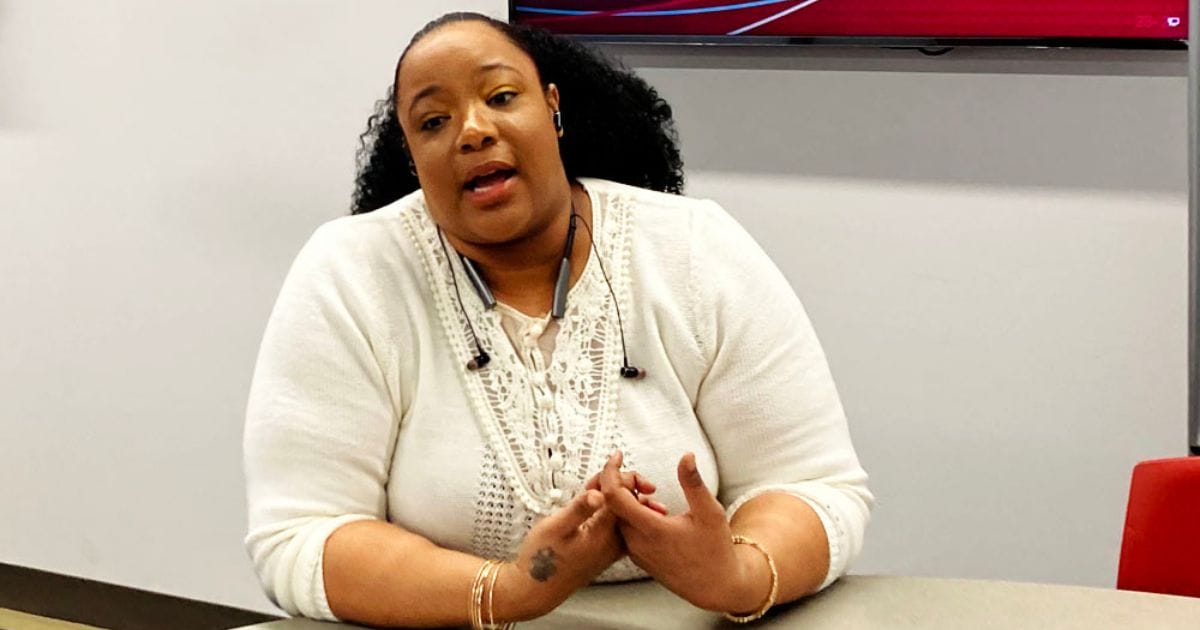Emerald Garner
Lessons on fighting police brutality and helping families heal
What would you have done, Emerald Garner wanted to know, if you had been in her position after your father had been killed by police.
Garner, the daughter of Eric Garner – whose life ended on the streets of New York City during an arrest on July 17, 2014 – came to Indiana University Northwest Thursday, January 18, as part of campus activities observing the Dr. Martin Luther King, Jr. Holiday.
His final words “I can’t breathe” and death while in a police chokehold reverberated nationwide. It became an indictment of the police and what some in law enforcement said was unnecessary use of force, while the public called it police brutality.
James Wallace, Director of IUN’s Office of Diversity, Equity & MultiCultural Affairs said, “Garner represents the advocacy and resiliency that can make our communities a better place.”
In 2020, the state of New York passed the Eric Garner Anti-Chokehold Act.
When a police officer injures or kills somebody through the use of “a chokehold or similar restraint,” they can be charged with a class C felony, punishable by up to 15 years in prison. Garner is now working on making the law a federal offense.
The Eric Garner law passed on June 8, a week after a Minneapolis police officer held his knee on the neck of a handcuffed and on the ground George Floyd, choking him to death.
She is the author of “Finding My Voice: On Grieving My Father Eric Garner and Pushing for Justice,” published in 2022 and now an audio book. It’s the story of a journey she hopes will help heal families affected by injustices like police violence and helps those who want to support them. “I don’t go where people do not support me or don’t support social justice,” Garner said.
Emerald was 22 when her father died, one of Garner’s six children. She was working and the mother of a 2-year-old. “My father died on a Tuesday and Saturday we were at the National Action Network. I was there every Monday after that.”
Garner didn’t want her audience to just sit and listen to her lecture. “I don’t want this to feel like you are in a class. I don’t want this to feel like you just came here to listen to me talk all day.” She asked for volunteers and 4 students in the audience joined her on stage to dialogue.
“How can you go to work, especially where there are TVs showing the news and everybody talking about seeing your father murdered?” she was asked.
“The issues that we had before my father was killed remained after his murder and were magnified times a thousand,” Garner wrote in Finding My Voice. What the family needed, she said, were therapy, mental health and bereavement counseling.
For the next 3 years, her older sister Erica Garner organized protests and marches with the support of the National Action Network, the organization led by Rev. Al Sharpton. “For 3 years, Erica demonstrated outside the police station where the officer worked and the courthouses. She was fearless,” Garner said.
“I had to find my voice in the movement,” Garner said. “I started speaking at the churches. I started inviting people to come to the church, to hear me talk or have an intimate conversation. Being out in the streets and protesting was not for me. Number one, if I get arrested, they are going to take the children. Number two, who is going to bail me out?”
She organized a petition drive to get Dan Pantaleo, the police officer fired; 150,000 people signed it.
In December 2017, Erica died of a heart attack. She was 27 and the previous August had given birth to a son. Emerald took up the activist baton and the care of Erica’s two children, the oldest was six. “It was a tragedy. She lost her life to the movement. She went to every event, worked with every group. She didn’t take time for herself,” Garner said.
Supporters can find a role in the movement, Garner says. “We don’t want grandma who’s in a wheelchair going out to these protests, because we know that they can turn violent. But we can have grandma answering phone calls and helping young people navigate that anger.”
Garner said she is still finding her role. “I got a law passed. Now I’m interested in becoming a lawyer.”






